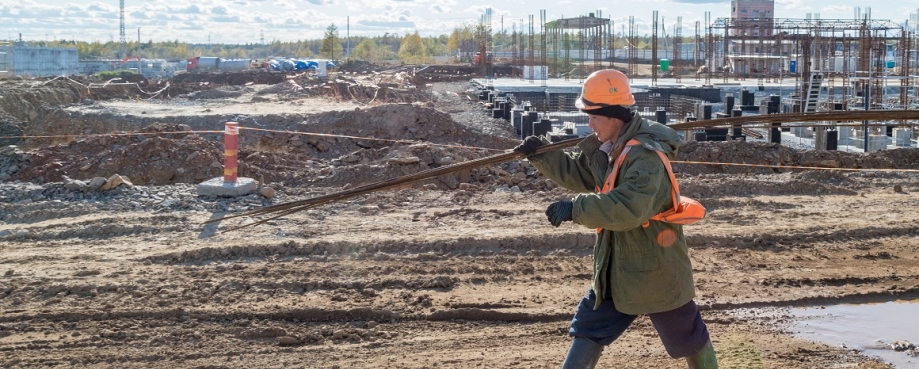
Ex-US President Barak Obama branded North Korea a “pariah state”. He said that the government in Pyongyang would "rather starve its people than feed their hopes and dreams". In this blog, Ben Rutledge writes about ETI’s latest briefing paper on the export of North Korean workers to earn money for the state. And the risks for companies.
Download our briefing paper on the business and human rights risks relating to North Korean state-sponsored forced labour in global supply chains.
News coverage about the Democratic People's Republic of Korea (DPRK), or North Korea as its more commonly known, is usually dominated by stories from within the country.
We’ve seen this range from nuclear missile testing and relations with South Korea to the poor treatment and exploitation of North Korean citizens.
Just last month, international media reported on dozens of ‘child slaves’, some as young as five, allegedly forced to work in chain gangs. They were secretly captured on video inside North Korea doing forced hard labour for up to 10 hours a day working to repair a railway.
Sent abroad to earn money for the state
What is less well reported is the system of state-sponsored forced labour organised by North Korea, where tens of thousands of its citizens are sent abroad to earn money for the state.
"North Korean workers have been identified in 16 different countries."
It is estimated that 150,000 or more North Koreans may currently be working overseas.
Whilst the clear majority are working in Russia and China, North Korean workers have been identified in 16 different countries across the Middle East, Asia, Europe and Africa in recent years.
ETI has therefore produced a briefing paper identifying key business and human rights risks relating to North Koreans working overseas.
This includes information on what companies can and should be doing to prevent forced labour, with tools and guidance notes, as well as case studies in the agricultural and garment sectors.
A lucrative system
The North Korean labour export system is based on the exploitation of its citizens under conditions of forced labour. This is defined by the International Labour Organisation as work undertaken involuntarily under threat of a menace or penalty.
"The system is highly lucrative and a crucial source of foreign currency for North Korea."
It includes workers having their passports confiscated, very long working hours, restricting workers’ freedom of movement and having the bulk of their salaries paid at the end of lengthy contracts.
Government “minders” are allegedly sent to monitor and control the workers, while the threat of reprisals against workers or their families still living in North Korea helps to ensure that they will adhere to the rules.
The system is highly lucrative and a crucial source of foreign currency for North Korea.
The United Nations has estimated that over half of the workers’ wages are appropriated by the state through taxation and other deductions, resulting in upwards of $2.3billion (£1.5billion) in foreign currency for Kim Jong-un’s regime.
Most workers sent to Russia and China reportedly take on jobs in labour-intensive sectors such as construction or logging. However, thousands are also said to be working in factories, agricultural fields and restaurants.
"Whilst there may be fewer workers sent to the EU compared to Asia, deployment is financially more profitable."
As recently as 2016, Malta and Poland both had agreements in place to issue visas to workers from North Korea.
Whilst there may be fewer workers sent to the EU compared to Asia, deployment is financially more profitable per citizen due to significantly higher individual earnings.
Businesses sourcing from European countries alone, therefore should not discount this risk.
How to address forced labour
"It is part of a wider global epidemic of forced labour exploitation and trafficking – one that has enabled North Korea to exploit the system to its benefit."
Companies, in partnership with trade unions, civil society, governments and others, should be particularly mindful of the risk of state-sponsored forced labour when conducting their Human Rights Due Diligence.
Consequently, this briefing note pays particular attention to the specific measures that should be taken to remove forced labourers if found, with adequate services and assistance provided to the workers in the transition out of forced labour.
While the risk of North Korean workers in supply chains should not be over-emphasised, it should not be viewed in isolation either.
It is part of a wider global epidemic of forced labour exploitation and trafficking – one that has enabled North Korea to exploit the system to its benefit.
Businesses can and should play a vital role in the elimination of forced labour.
ETI has also published a Human Rights Due Diligence Framework which provides more general guidance to stakeholders on risk assessment, mitigation and access to remedy, as well as other materials on modern slavery and how business can contribute to slavery alleviation.
Download our briefing paper on the business and human rights risks relating to North Korean state-sponsored forced labour in global supply chains.
